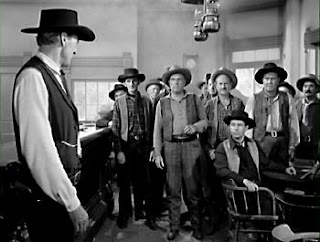The story seems to mean different things to different people . . . [Producer Stanley] Kramer, who had worked closely with [Carl] Foreman on the script, said it was about a town that died because no one there had the guts to defend it. Somehow this seemed to be an incomplete explanation . . . I vaguely sensed deeper meanings in it; but only later did it dawn on me that this was not a regular Western myth.1
- Fred Zinnemann, Director
I first watched High Noon in my early twenties. I had just received my degree in Film Studies and was accustomed to looking for "against the grain" readings of popular movies, or, at the very least, to looking at westerns like The Searchers and The Man Who Shot Liberty Valence as essays on the diminishing relevance of the traditional Western hero. So I was well prepared to do the following: First, to assume that High Noon had one established popular reading, and Second, to find one counter to it.
It was my preconceived supposition (based upon the bits and pieces I had heard about it already) that High Noon was probably a conservative film, one which advocated confrontation and machismo over reason and an intellectual society. What I saw instead was a refutation of that; I saw the townspeople — many of whom did not seem to object to convict Frank Miller's pending return — letting their marshal know that his outdated code of honor must not interfere with the continuing development of the town. In marshal Will Kane I saw a man who refused to put the safety of the town in front of his own personal grudge with Miller. I agreed, essentially, with the plea made by Hadleyville's mayor (played by Thomas Mitchell), that gunfighting would damage the growing town's reputation, and that Kane should leave at once and take his problems with him. To me, the treatment of Kane was in line with the door shutting on Ethan Edwards or the coffin lid being closed on Tom Doniphon.
Cut to twenty years later.
I recently watched High Noon for the second (then third, fourth, and fifth) time, and my thoughts were very different. This time I felt more sympathy for Kane. He became the target of Miller's revenge while in the service of the town, after all, so why shouldn't the town stand up for him later (much in the same way our government offers secret service protection to former presidents)? And despite the fact that Miller and his gang had been arrested or run out of town, the handful of years since then did not seem sufficient for the people to be able to consider their nascent town free of the troubles of the lawless West. Surely they needed to contribute more than taxes to establishing and preserving a peaceful society.
I also learned, thanks to DVD special features that were not available on the VHS copy I had originally watched, that screenwriter Carl Foreman had meant for High Noon to reflect the oppression of blacklisting in the era of McCarthyism, something he was experiencing at the time. In my subsequent viewings, I could easily see how Kane could represent a blacklisted professional whose friends and colleagues no longer want to have anything to do with him for fear of the consequences (the death of one's Hollywood career being represented by the possibility of physical death in a gunfight). I was pleased to know that such a liberal message could exist in a Western — indeed, be one of its stronger readings.
At the same time, I could very easily see how the movie could be appropriated by the Right. The townspeople could certainly represent stereotypical liberals — intellectuals who would rather debate the issue than take real action (as they do in the church scene), and who feel their problems should be solved by government (one of the citizens feels the politicians "up north" are responsible for Miller's parole, so they should somehow take care of things; another says that Kane is paid to take care of such matters himself).
I was therefore not surprised to learn that the movie has been revered and condemned by conservatives and liberals alike (see High Noon's Wikipedia entry for some interesting examples), nor that among its fans are political leaders of opposing parties, for many of the questions asked by the film concern the relationship between government and citizens:
- Who is directly responsible for the welfare of society — the people or its appointed officials?
- Do people need to take direct action in society, or is it enough to vote and pay taxes?
- How much responsibility does the citizenry have toward its appointed officials?
- Where is the line between an appointed official's professional and personal duties?
1Zinnemann, Fred: A Life in the Movies: An Autobiography (New York: Charles Scribner's Sons, 1992), 96.



0 comments:
Post a Comment